六年级语法:一般过去时的用法
六年级【一般过去时的用法】

一般过去时的用法一、概念表示在的过去某个时间里所发生的动作或存在的状态。
通常在句子里找到表示过去时间的词或词组。
如:yesterday,yesterday morning,yesterday afternoon,yesterday evening,the day before yesterday(前天),last night,last week,last month,last year,a moment ago(刚才),just now (刚才),two days ago,a week ago,in 1990等。
如:I went to bed at eleven last night. 昨晚我11:00睡觉。
一般过去时四种用法;例如:I went to school at 7:00 yesterday morning.我昨天早晨七点去上学。
②表示在过去某个时间存在的状态。
例如:She was not at home last night.她昨晚八点没在家。
③表示在过去经常或反复发生的动作,常和often(经常)、always(总是)、sometimes (有时)等表示频率的时间状语连用。
例如:He often had lunch at school last month.他上个月经常在学校吃午饭。
④表示已故的人所做的事情或情况。
例如:Ba Jin wrote a lot of novels for us.巴金写了很多部小说。
二、动词过去式的构成规律(一)规则动词的过去式1.一般情况下,在动词原形后面加-ed;look→looked play→played start→started visit→visited2.以不发音e结尾的动词,在词尾直接加-d;live→lived use→used3.以“辅音字母+ y”结尾的动词,先将y 改为i ,再加–ed;study→studied, tr y→tried fly→flied4.以重读闭音节(即辅音+元音+辅音)或r音节结尾,末尾只有一个辅音字母的动词,要先双写这个辅音字母后,再加–ed。
小学六年级英语一般过去式语法知识点
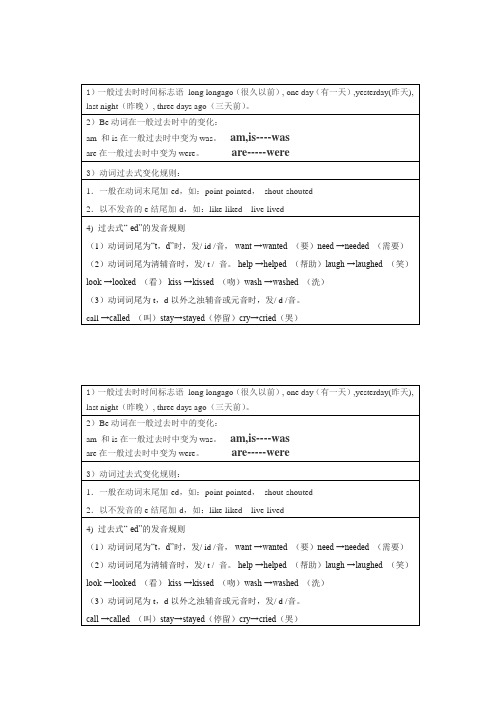
(3)动词词尾为t,d以外之浊辅音或元音时,发/ d /音。
call →called(叫)stay→stayed(停留)cry→cried(哭)
1)一般过去时时间标志语long longago(很久以前), one day(有一天),yesterday(昨天), last night(昨晚), three days ago(三天前)。
2)Be动词在一般过去时中的变化:
am和is在一般过去时中变为was。am,is----was
are在一般过去时中变为were。are-----were
3)动词过去式变化规则:
1.一般在动词末尾加-ed,如:point-pointed,shout-shouted
2.以不发音的e结尾加-d,如:like-liked live-lived
4)过去式“-ed”的发音规则
(1)动词词尾为“t,d”时,发/ id /音,want →wanted(要)need →needed(需要)
1)一般过去时时间标志语long longago(很久以前), one day(有一天),yesterday(昨天), last night(昨晚), three days ago(三天前)。
2)Be动词在一般过去时中的变化:
am和is在一般过去时中变为was。am,is----was
are在一般过去时中变为were。are-----were
(2)动词词尾为清辅音时,发/ t /音。help →helped(帮助)laugh →laughed(笑)look →looked(看)kiss →kissed(吻)wash →washed(洗)
外研社(三起)小学英语六年级下册一般过去时

Infinitive am / is are begin break bring build buy can
常见不规则动词
Past tense was were began broke brought built bought could
__D_i_d__ he __f_in_d_ ___a_n_y_ meat in the fridge?
3. She stayed there for a week.(对画线部分提问)
__H_o_w__ __lo_n_g__ __d_id__ she _s_t_ay__ there?Leabharlann That’s great!
1. Xiao Lin went fishing this morning.(改为一般疑问句) 2. We visited our teacher last night.(就画线部分提问) 3. He had lunch at school.(改为否定句) 4. There was some milk in the bottle. (就画线部分提问) 5. He went to that city with his uncle. (改为一般疑问句)
行为动词的一般过去式: a. 规则动词的变化规则: (1)一般动词直接加-ed (2)以e结尾的动词直接加-d (3)以辅音字母加y结尾的词,变y为i再加-ed (4)以重读闭音节结尾,词尾只有一个辅音字母,双写辅音字母加-ed
注:规则动词过去式的发音: 在清辅音后读/t/,在元音和浊辅音后读/d/,在辅音/t/,/d/后读 /id/。 b. 不规则动词变化需参看不规则动词表逐一熟记。
Exercise
按要求完成下列句子。
1. Lucy did her homework at home.(改为否定句)
一般过去时的构成及用法
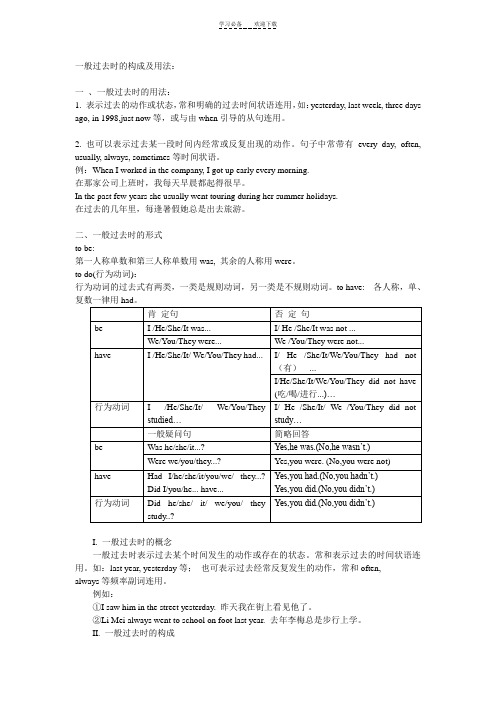
一般过去时的构成及用法:一、一般过去时的用法:1. 表示过去的动作或状态,常和明确的过去时间状语连用,如:yesterday, last week, three days ago, in 1998,just now等,或与由when引导的从句连用。
2. 也可以表示过去某一段时间内经常或反复出现的动作。
句子中常带有every day, often, usually, always, sometimes等时间状语。
例:When I worked in the company, I got up early every morning.在那家公司上班时,我每天早晨都起得很早。
In the past few years she usually went touring during her summer holidays.在过去的几年里,每逢暑假她总是出去旅游。
二、一般过去时的形式to be:第一人称单数和第三人称单数用was, 其余的人称用were。
to do(行为动词):行为动词的过去式有两类,一类是规则动词,另一类是不规则动词。
to have: 各人称,单、复数一律用had。
I. 一般过去时的概念一般过去时表示过去某个时间发生的动作或存在的状态。
常和表示过去的时间状语连用。
如:last year, yesterday等;也可表示过去经常反复发生的动作,常和often,always等频率副词连用。
例如:①I saw him in the street yesterday. 昨天我在街上看见他了。
②Li Mei always went to school on foot last year. 去年李梅总是步行上学。
II. 一般过去时的构成我们主要来学习谓语动词为实义动词的一般过去时的构成。
动词过去式的构成:(1)规则动词过去式的构成有四条规则:①一般在动词原形末尾直接加上-ed。
如:look-looked。
一般过去时的语法
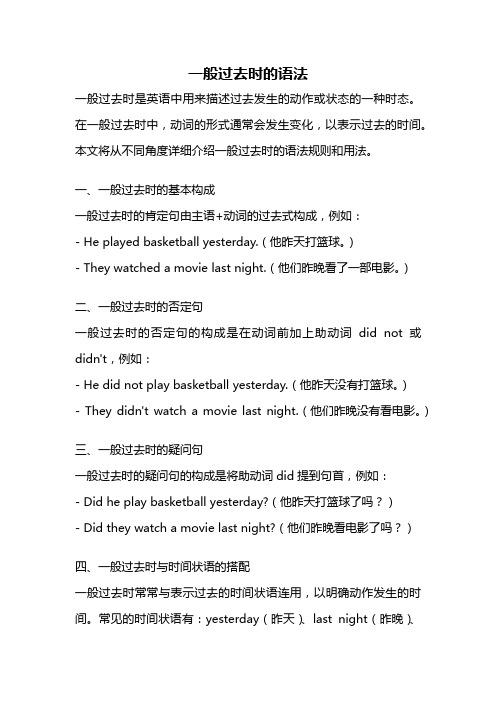
一般过去时的语法一般过去时是英语中用来描述过去发生的动作或状态的一种时态。
在一般过去时中,动词的形式通常会发生变化,以表示过去的时间。
本文将从不同角度详细介绍一般过去时的语法规则和用法。
一、一般过去时的基本构成一般过去时的肯定句由主语+动词的过去式构成,例如:- He played basketball yesterday.(他昨天打篮球。
)- They watched a movie last night.(他们昨晚看了一部电影。
)二、一般过去时的否定句一般过去时的否定句的构成是在动词前加上助动词did not或didn't,例如:- He did not play basketball yesterday.(他昨天没有打篮球。
)- They didn't watch a movie last night.(他们昨晚没有看电影。
)三、一般过去时的疑问句一般过去时的疑问句的构成是将助动词did提到句首,例如:- Did he play basketball yesterday?(他昨天打篮球了吗?)- Did they watch a movie last night?(他们昨晚看电影了吗?)四、一般过去时与时间状语的搭配一般过去时常常与表示过去的时间状语连用,以明确动作发生的时间。
常见的时间状语有:yesterday(昨天)、last night(昨晚)、last week(上周)、in 2010(在2010年)等等。
五、一般过去时的用法1. 表示过去发生的动作或状态She lived in New York for five years.(她在纽约住了五年。
)2. 表示过去经常或反复发生的动作He often went swimming when he was young.(他年轻时经常去游泳。
)3. 表示过去的习惯或常态She always cooked dinner for her family.(她过去总是为家人做晚饭。
一般过去时的用法及结构

一般过去时的用法及结构1.一般过去时的基本用法一般过去时表示过去某个时间发生的动作或存在的状态,也可表示过去经常或反复发生的动作。
常和表示过去的时间状语连用,如yesterday, last week, last night, in 2003, two days ago 等。
【举例】 I got up at 6:30 yesterday. 我昨天6:30起床。
My father was very busy last week. 我父亲上周很忙。
2.一般过去时的基本结构⑴肯定句“主语+动词过去式+其他”或者“主语+was/were+其他”。
【举例】 I played tennis last weekend. 我上周末打网球了。
My school trip was great. 我的学校郊游棒极了。
⑵否定句“主语+didn’t+动词原形+其他”或“主语+wasn’t/weren’t+其他”。
【举例】 The girl didn’t play computer games yesterday afternoon.这个女孩昨天下午没玩电子游戏。
Old Henry wasn’t happy last Friday. 上星期五老亨利不高兴。
⑶一般疑问句“Did+主语+动词原形+其他?”肯定回答为“Yes,主语+did”,否定回答为“No,主语+didn’t”或者“Was/Were+主语+其他?”肯定回答为“Yes,主语+was/were”,否定回答为“No,主语+wasn’t/weren’t”。
【举例】— Did you go to the beach? 你们去海滩了吗?— Yes, we did./No, we didn’t. 是的,我们去了。
/不,我们没有。
— Was your weekend OK? 你的周末过得还行吧?— Yes, it was./No, it wasn’t. 是的,还行。
/不,不行。
过去时的用法
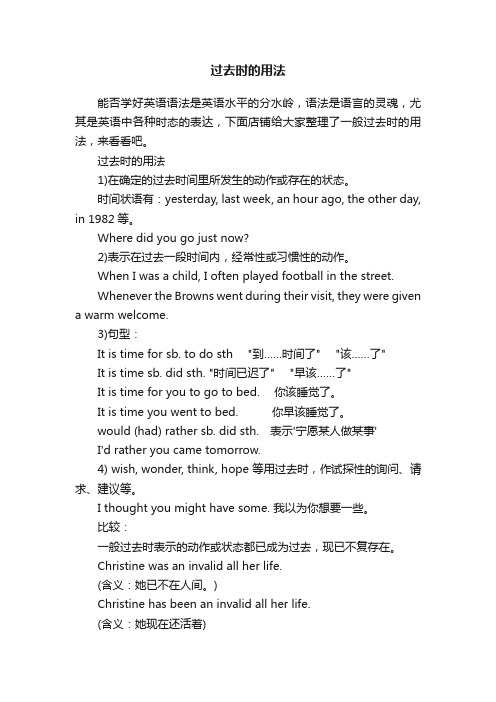
过去时的用法能否学好英语语法是英语水平的分水岭,语法是语言的灵魂,尤其是英语中各种时态的表达,下面店铺给大家整理了一般过去时的用法,来看看吧。
过去时的用法1)在确定的过去时间里所发生的动作或存在的状态。
时间状语有:yesterday, last week, an hour ago, the other day, in 1982等。
Where did you go just now?2)表示在过去一段时间内,经常性或习惯性的动作。
When I was a child, I often played football in the street.Whenever the Browns went during their visit, they were givena warm welcome.3)句型:It is time for sb. to do sth "到……时间了" "该……了"It is time sb. did sth. "时间已迟了" "早该……了"It is time for you to go to bed. 你该睡觉了。
It is time you went to bed. 你早该睡觉了。
would (had) rather sb. did sth. 表示'宁愿某人做某事'I'd rather you came tomorrow.4) wish, wonder, think, hope 等用过去时,作试探性的询问、请求、建议等。
I thought you might have some. 我以为你想要一些。
比较:一般过去时表示的动作或状态都已成为过去,现已不复存在。
Christine was an invalid all her life.(含义:她已不在人间。
)Christine has been an invalid all her life.(含义:她现在还活着)Mrs. Darby lived in Kentucky for seven years.(含义:达比太太已不再住在肯塔基州。
小学英语语法时态一般过去时详解
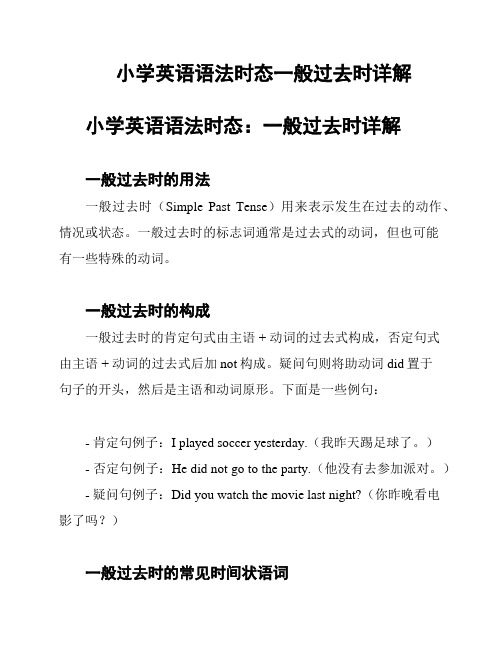
小学英语语法时态一般过去时详解小学英语语法时态:一般过去时详解一般过去时的用法一般过去时(Simple Past Tense)用来表示发生在过去的动作、情况或状态。
一般过去时的标志词通常是过去式的动词,但也可能有一些特殊的动词。
一般过去时的构成一般过去时的肯定句式由主语 + 动词的过去式构成,否定句式由主语 + 动词的过去式后加not构成。
疑问句则将助动词did置于句子的开头,然后是主语和动词原形。
下面是一些例句:- 肯定句例子:I played soccer yesterday.(我昨天踢足球了。
)- 否定句例子:He did not go to the party.(他没有去参加派对。
)- 疑问句例子:Did you watch the movie last night?(你昨晚看电影了吗?)一般过去时的常见时间状语词一般过去时通常会和一些时间状语词一起使用,以明确动作发生的具体时间。
以下是一些常见的时间状语词:- yesterday(昨天)- last week(上周)- two days ago(两天前)- in 1998(在1998年)一般过去时的特殊用法一般过去时有一些特殊的用法需要注意:1. 表示过去经常性的动作或惯。
例如:When I was young, I played soccer every day.(当我年轻时,我每天都踢足球。
)2. 表示过去事实或真理。
例如:The earth revolved around the sun.(地球绕太阳转。
)总结一般过去时用来描述发生在过去的动作、情况或状态。
它的构成简单,使用过去式的动词作为标志词。
通过加入时间状语词,可以更明确地指出动作发生的具体时间。
同时,一般过去时还有一些特殊的用法,需要灵活运用。
>注意:本文内容仅供参考,具体使用时请根据实际情况和教材要求进行调整。
- 1、下载文档前请自行甄别文档内容的完整性,平台不提供额外的编辑、内容补充、找答案等附加服务。
- 2、"仅部分预览"的文档,不可在线预览部分如存在完整性等问题,可反馈申请退款(可完整预览的文档不适用该条件!)。
- 3、如文档侵犯您的权益,请联系客服反馈,我们会尽快为您处理(人工客服工作时间:9:00-18:30)。
一般过去时的用法
1.一般过去时表示过去某个时间发生的动作或存在的状态,常和表示过去的时间状语连用。
一般过去时也表示过去经常或反复发生的动作。
2.Be动词在一般过去时中的变化:
⑴am 和is在一般过去时中变为was。
(was not=wasn't)
⑵are在一般过去时中变为were。
(were not=weren't)
⑶带有was或were的句子,其否定、疑问的变化和is, am, are一样,即否定句在was或were后加not,一般疑问句把was或were调到句首。
3.句中没有be动词的一般过去时的句子
否定句:didn't +动词原形,如:Jim went home yesterday.
Jim didn't go home yesterday.
一般疑问句:在句首加did,句子中的动词过去式变回原形。
如:Jim went home yesterday.
Did Jim go home yesterday?
特殊疑问句:⑴疑问词+一般疑问句?如:Jim went home yesterday. Did Jim go home yesterday?
What did Jim do yesterday?
动词过去式变化规则:
1.一般在动词末尾加-ed,如:pull-pulled, cook-cooked
2.结尾是e加d,如:taste-tasted
3.末尾是辅音字母加一个元音字母和一个辅音字母的重读闭音节,应双写末尾的辅音字母,再加-ed,如:stop-stopped
4.以“辅音字母+y”结尾的,变y为i,再加-ed,如:study-studied
5.不规则动词过去式:
过去时练习
写出下列动词的过去式
is\am_____________ fly____________ plant____________
are ____________drink_____________ play___________go______________ make ________
does_____________ dance__________ worry___________
ask ___________taste_____________ eat____________ draw____________ put ____________throw____________ kick___________ pass____________ do __________
Be动词的过去时练习(1)
一、用be动词的适当形式填空
1.I _______ at school just now.
2.He ________ at the camp last week.
3.We ________ students two years ago.
4.They ________ on the farm a moment ago.
5.Yang Ling ________ eleven years old last year.
6.There ________ an apple on the plate yesterday.
7.There ________ some milk in the fridge on Sunday.
8.The mobile phone _______ on the sofa yesterday evening.
二、句型转换
1. It was exciting.
否定句:________________________________________________
一般疑问句:____________________________________________
肯、否定回答:__________________________________________
2. All the students were very excited.
否定句:________________________________________________
一般疑问句:____________________________________________
肯、否定回答:__________________________________________
3. They were in his pocket.
否定句:________________________________________________
一般疑问句:____________________________________________
肯、否定回答:__________________________________________
Be动词的过去时练习(2)
一、用be动词的适当形式填空
1.I ______ an English teacher now.
2.She _______ happy yesterday.
3.They _______ glad to see each other last month.
4.Helen and Nancy ________ good friends.
5.The little dog _______ two years old this year.
6.Look, there ________ lots of grapes here.
7.There ________ a sign on the chair on Monday..
8.Today _______ the second of June. Yesterday ______ the first of June. It _____ Children's Day. All the students ______ very excited.
二、句型转换
1. There was a car in front of the house just now.
否定句:________________________________________________
一般疑问句:____________________________________________
肯、否定回答:__________________________________________
肯、否定回答:__________________________________________
三、中译英
1. 我的故事书刚才还在手表旁边。
My storybook _______ beside the watch ______ _______.
2. 他们的外套上个礼拜放在卧室里了。
Their ________ ________ in the bedroom _______ __________.
3. 一会以前花园里有两只小鸟。
There _________ two _________ in the garden ______ _________ ___________.。
